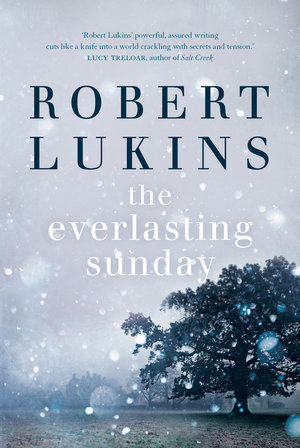Robert Lukins’ debut novel The Everlasting Sunday (UQP 2018) is a literary delight, a story comprised of poetry, a celebration of the rhythm of language. Set in the coldest winter on record in England in 1962, the novel takes place in Goodwin Manor, a home for boys who have been ‘found by trouble’. In the opening pages, 17-year-old Radford finds himself negotiating the intricacies of the home – the hardened loyalties, the twisted friendships, the turmoil of adolescent hormones, the secrets kept and confidences shared. As the freezing winter takes control of that place, the busy microcosm of the home shelters Radford from his past, but continually throws up challenges that confront his notion of himself and what he wants from life. His friends each have a past too terrible to talk about; through pilfered alcohol and shared cigarettes, they form connections both fragile and deep. The staff of Goodwin Manor are shrouded in their own mysteries.
This book tells a simple story of survival, of boys forced together through circumstance, and of the shocking events of one winter that tear everything apart. And while the story itself is compelling and compassionate and strange, it is the telling that is captivating. Lukins’ voice is powerful and unusual; his words dance lightly across the pages before falling heavily with some new revelation. The tension and sense of menace that accompanies his storytelling ratchets up with each chapter … we can feel the suspense, the teenage angst, the creeping anxiety, the fear.
Lukins’ characters are finely drawn and memorable. West and Teddy, Lillian and Manny – the cast is disparate and quirky and authentic. The setting – both the place of Goodwin Manor, and the season of Winter – is a character all its own, an immersive and captivating place and time so real that we can feel the icy snow, see the frozen birds, hear the crackling of the fire.
Lukins knows how to use white space, how to say less rather than more. The story is not a neatly-tied package, but a shifting fist of snowflakes, melting and reforming into something new. Like all the best stories, it asks more questions than it answers, and leaves us wanting more. Radford and his friends – bad boys though they might be – imprint on our hearts with their childish longings. Their immature hopes and desires are compressed into burgeoning bodies and shoehorned into societal norms; their sweet innocence belies their troubled histories. We see children, not monsters.
This is a compassionate and empathetic story that will linger; a compact and tightly-woven spell that will move you as you fear the worst and hope for the best.

